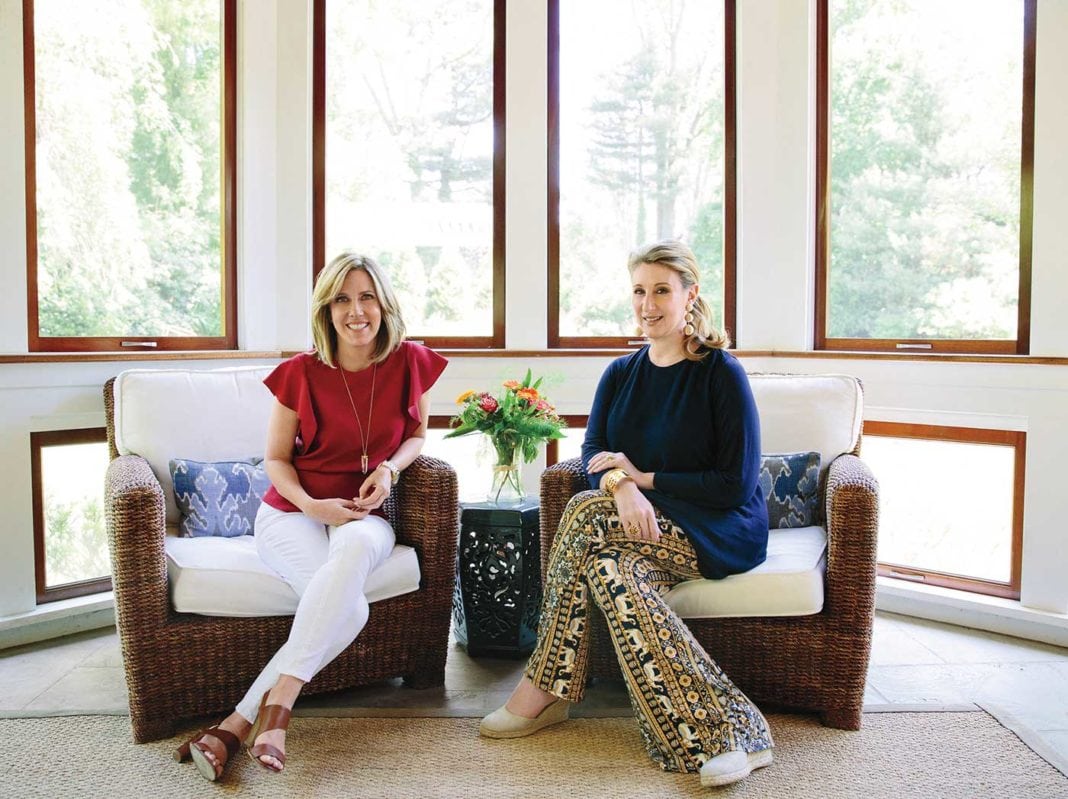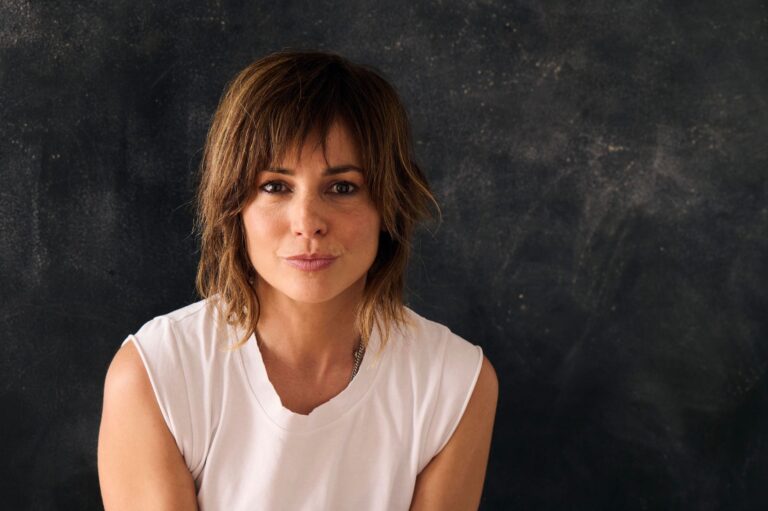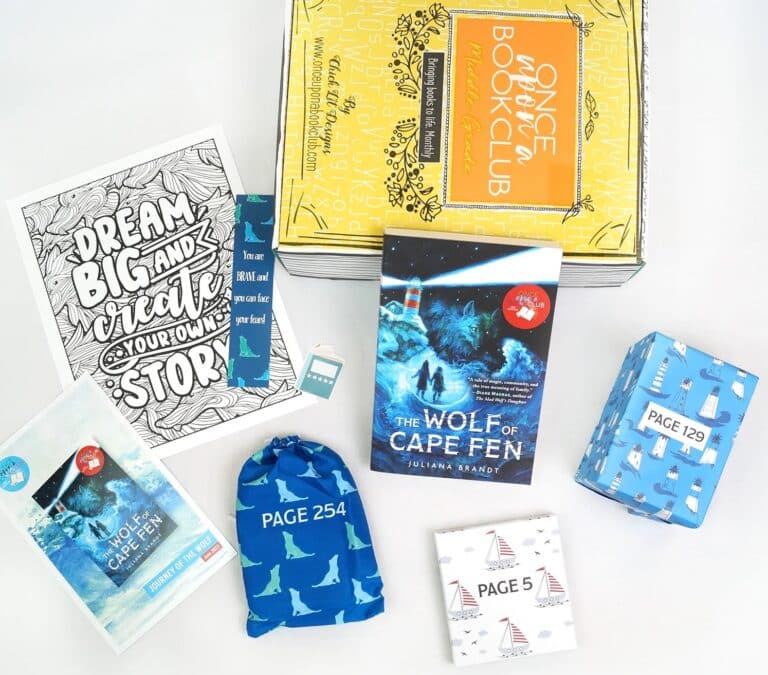When Alisyn Camerota, the co-host of CNN’s New Day, first moved to Westport six years ago, a mutual friend suggested she reach out to Jane Green, the New York Times bestselling author, who also lived in town. The two media powerhouses struck up a friendship that continues today. Here, they sit down for a one-on-one conversation about everything from their writing process—Camerota’s debut novel Amanda Wakes Up, came out last year, and Green’s latest novel, The Sunshine Sisters, is out in paperback this summer—to the importance of family dinners to what they’re working on next.
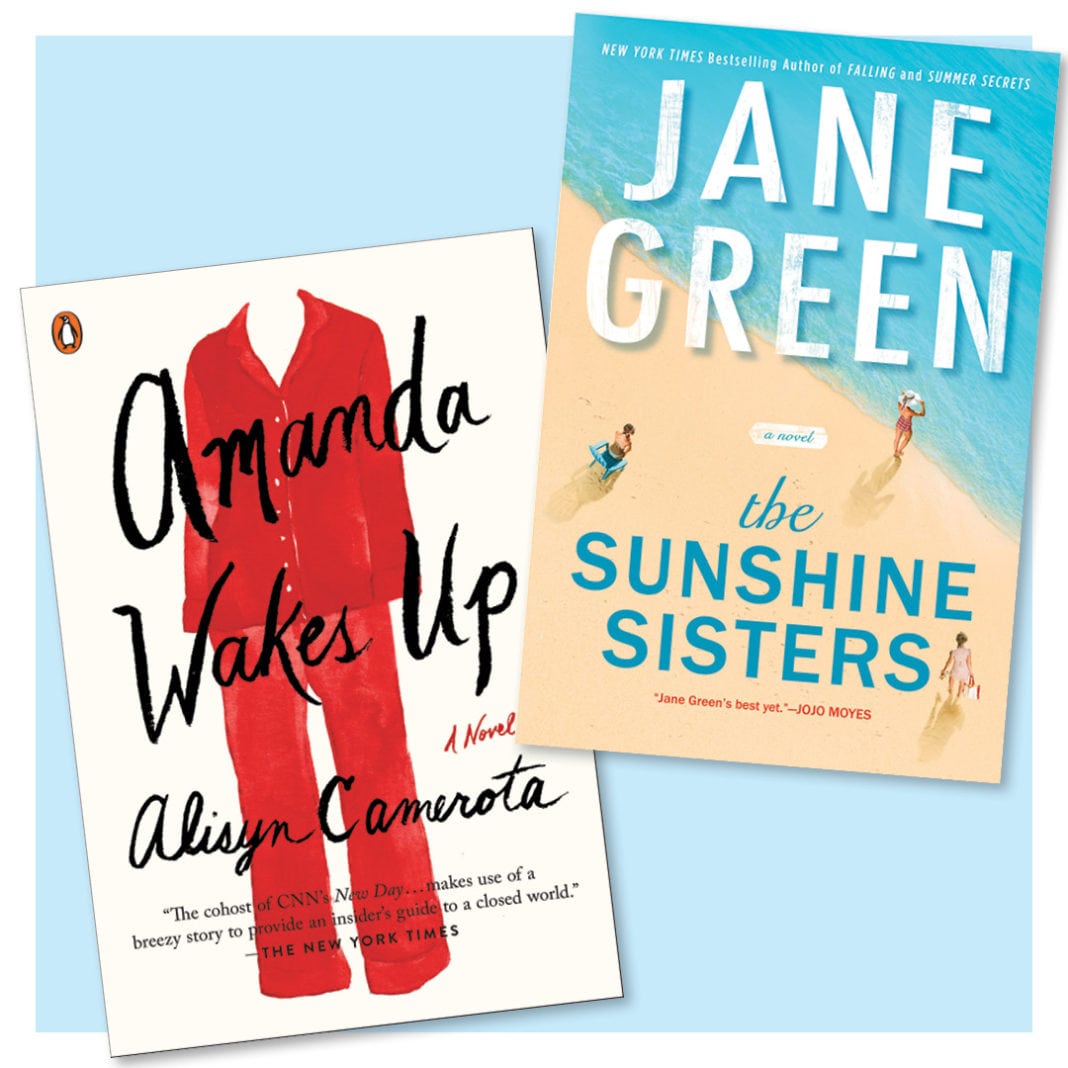 Alisyn Camerota: Do you remember how we met? When I was moving to Westport, Allison Winn Scotch, a mutual friend and also an author, said that I had to contact you, which I immediately did.
Alisyn Camerota: Do you remember how we met? When I was moving to Westport, Allison Winn Scotch, a mutual friend and also an author, said that I had to contact you, which I immediately did.
Jane Green: I remember how incredibly lonely and overwhelming it was for me—and I moved here 17 years ago not knowing anyone. So as soon as Allison said, my friend Alisyn is moving, I said, “Come over, come over!” A couple of weeks later you sent an email and it was very clear that you were completely overwhelmed by the move and living here—and that was it. We became friends after that.
AC: Wait a minute, you’re burying the lede! You’re forgetting one very vital part of this. You said, “Oh, I’ll invite you to do social things,” and I said, “I don’t know, I don’t have anything to do.” And you said, “Oh, I’ll take care of that, I’ll invite you to do something,” and you said, “How about tonight? Would you like to have dinner with Martha Stewart and me?” And I was like, “Sure!”
JG: That was amazing actually. We went to the Bedford Post Inn.
AC: Richard Gere was there.
JG: And Carey Lowell, in fact, hosted our dinner. That was a very glamourous night. That was when I used to go out! I don’t go out anymore!
AC: Why is that? What happened?
JG: When your kids are small—and your kids are younger than mine—it’s much easier to go out because my kids were always in bed at 7 p.m. We had such an active social life and I never felt guilty, because it was fine, my kids were asleep! And now I’ve got a range from 22 down to almost 15. First of all, they need you more. And second of all, I want to be with them. I love having family dinners and I love sitting with my kids. I’ve become a complete recluse.
AC: It’s a testament to you that your teenage kids want to be at home with you.
JG: They’re also homebodies. But our house has always been the house that people come to. Three nights ago, my college graduate came home and on the way home she was phoning all her friends, and within three hours we had 15 kids in the hot tub. I don’t know how they fit; it was hilarious. We had burgers on the grill and we had beers in the fridge and the music was playing, and it was lovely, and it feels like summer to me. How about you?
AC: My girls turned 13 and since then they’re like, “Mom, you’re not wearing that out, are you?” I get a lot of, “Mom, what happened to your hair? Why is your hair like that?” It really affects them—they are personally affronted if I have a bad hair day.
JG: When we first met, you were doing your newscasting, and you had started to do a writing course because you had an idea for a novel. How was that process for you?
AC: Well, it was a steep learning curve. I didn’t know anything about writing. I’d always liked writing letters, keeping a journal, but that doesn’t bear any resemblance to a novel. At that time, I was working at Fox News—I was a weekend anchor—and I was already quite frustrated with what I was seeing around me in journalism. There was all sorts of blurring of the lines between journalism and TV entertainment, and I didn’t think that the viewers were aware of that. So, I started having all these kinds of ethical dilemmas and coming home and writing about them. After about 10 of those I thought, “Huh, I wonder if this could form itself into a book?” And at that time, I was naïve enough to think, well, you just glue these together and badabing, you’ve got a book! No, actually you need character development and a plot arc and themes and you need to weave this all together, but I had the desire and I liked the process. Thank God you and no one else told me how huge an undertaking it was. I got to understand that there is a format, there are rules, there are things we’re trying to accomplish in this. It is bigger than just storytelling.
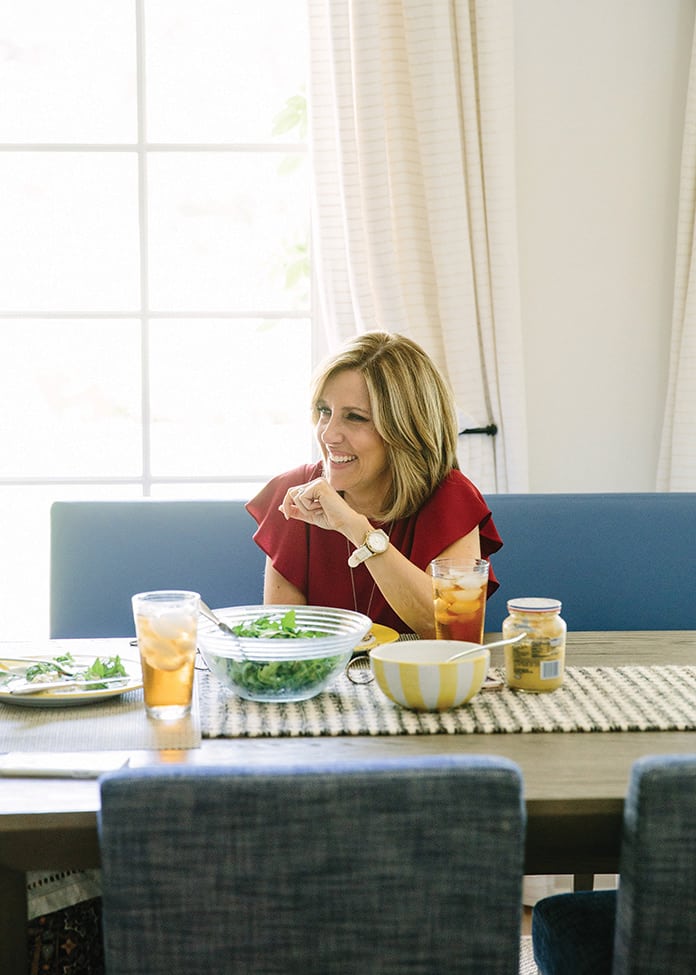
JG: It is so much more. But I think it’s really interesting you said you thought it was a series of vignettes. I wonder if that’s almost a journalistic approach. As a former journalist myself, that’s very much how I wrote my first book. Every day I’d sit down and write a chapter and it was a series of vignettes. Actually, in some ways I’ve almost gone back to that because, while I very much track the character’s development and the plot, I’ve also come to believe that every chapter almost has to stand alone.
AC: That’s interesting. What has your process been from the beginning until now? How have you changed?
JG: Well actually, the most transformative thing that has happened to me, and that has completely changed my career, happened about two months ago when I did the McKee’s Story Seminar in New York City. I had just delivered my new book and I was almost done with doing the re-writes. I did this three-day Story seminar and halfway through I thought, “Oh no. I’ve got to re-write this book from scratch!”
AC: Oh my God. Have you torn up your book and started over?
JG: Yup, I literally did. I’m rewriting the entire book.
AC: Your books are sometimes described as summer reads. Do you like that?
JG: I like it because when I think of what a summer read or what a beach read is, I think that it’s something that has escapist qualities. You’re going to dive in and be transported to another world. I don’t believe there’s anything wrong with that. I think for people who say it’s a guilty pleasure, they feel it somehow says something about themselves, that they may appear intellectually inferior, which I think is just a shame.
AC: I think that’s such a great point. What’s wrong with an absorbing book? Isn’t that what we’re all after?
JG: It’s like a romantic comedy. I mean who doesn’t love When Harry Met Sally? It’s the classic romantic comedy—really smart dialogue, and we all related to moments in that film. And the books that you and I are writing are very similar. They have emotional resonance and they’re real.
JG: Where do you read?
AC: I read in bed.
JG: Yeah, me too. I will often have bed days. That’s why I love winter, because I don’t feel guilty.
AC: I wish I had a bed day.
JG: See, that’s what happens when your children get to be teenagers that drive.
JG: But you get up at the crack of dawn. Do you take a nap?
AC: I do—otherwise, I can’t even string a sentence together.
JG: Do you do the 20-minute power nap, which is what Martha Stewart says is the only way? Or do you do the Jane Green weakling nap where you plan on waking up in 20 minutes and then, two and a half hours later you wake up going, “Oh my God, is it 5 in the morning?”
AC: I’m somewhere in between you two. I come off the set at 9 a.m. and by 10 a.m. I’m having a hard time actually stringing a sentence together.
JG: Did you imagine that this is where you’d be—that this is where your life would be?
AC: Yes. I did. This was my dream career when I was 15 years old. I decided—basically pulled out of the air—that this is what I wanted to do and I had no idea what the path was and I had no connections. I didn’t know how to become a broadcast journalist and a TV reporter, but that’s what I really wanted. And the idea that I could meet a wonderful, handsome guy and have three beautiful, healthy children was too good to wish for almost. And I definitely wanted to live in a town like this, that looked like this. This is the life that I was hoping for, but didn’t know that I’d be able to get. What about you?
JG: I was not dissimilar in that I had these romantic visions for my life. I never would have imagined that I would have had the longevity and the career that I’ve had. Twenty-three years later, I’m still writing New York Times bestsellers. I love living in Westport. I’ve lived in some wonderful houses and now I live in this antique—we call it Creaky Cottage. It’s very old and the floors slope and I have never, ever been happier in any house I’ve ever lived in. I have the most amazing husband, I have the most amazing children. My husband is my second and last husband. But I think perhaps, because I had a prior marriage—I had a practice marriage—I really appreciate what I have now. I knew that these kinds of love stories existed. I don’t know that I ever actually thought it would happen for me.
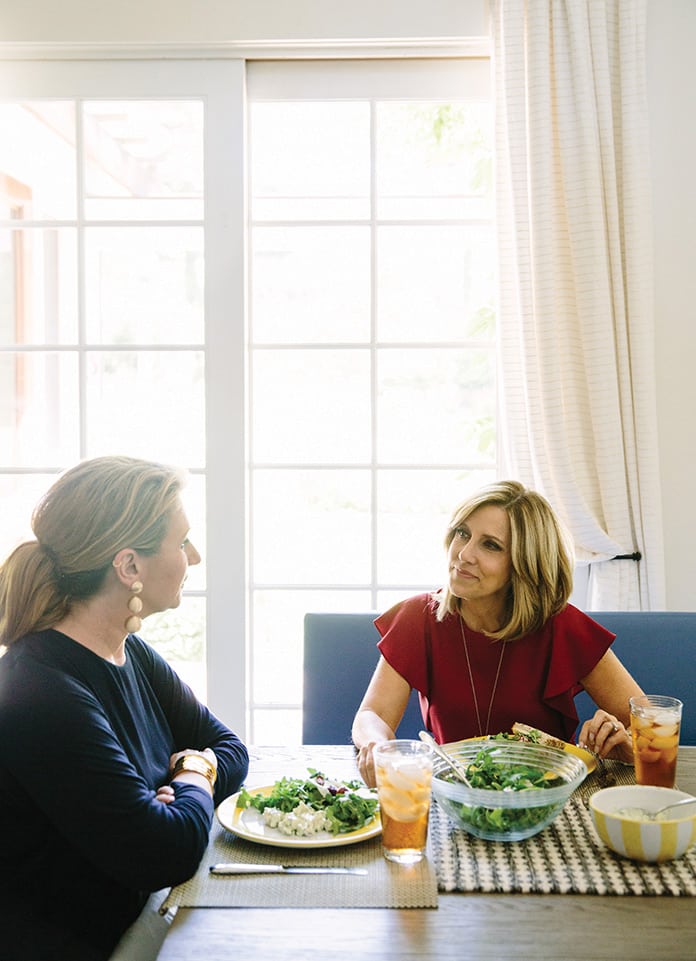
AC: So, what’s next for you?
JG: Actually, I could be veering off into a slightly different direction.
AC: This sounds like breaking news!
JG: It’s a little early but I will say that I have some not-ready-to-announce-yet TV/movie news, which is exciting. I’d love to get more involved in screenwriting. I think we’ll see what happens there. In the meantime, I’m also finishing my next novel for next year.
AC: What’s the name of it?
JG: Better Together—that’s the working title. And actually, that’s inspired by conversations that I find myself having with all of my friends. We’re all realizing we’re going to be empty nesters in the blink of an eye and we’re all saying, “Wouldn’t it be amazing if we all bought a farm somewhere and we all lived together?” So I’m writing a story about a group of old friends who realize they’re all on their own as they’re approaching 50 and they all decide to do this.
AC: That sounds fantastic.
JG: What’s next for you?
AC: I have another story that I’ve always wanted to tell and I’ve begun trying to write it. This one is a memoir about my crazy teenage years. I fell in love with a punk rock band when I was 13 and that somewhat changed the course of my life. I’ve always wanted to tell the story of my teenage years. One thing that everybody’s always talking about is how our generation was the least parented generation ever. For whatever reason—maybe because women were entering the workplace in droves, or fathers commuting, or socio-economic reasons, I don’t know.
JG: Right, I always describe my childhood as being raised by wolves.
AC: Absolutely. I describe mine as free-range.
JG: My kids today are free-range—but I’m sort of the anti-helicopter mom.
AC: And I applaud that in you. However, you’re still around.
JG: So the balance is, for me, we have a family meal. And I think this is the most crucial thing—at night, you sit with your kids around the table, there are no phones, and you talk. It’s grounding, it brings a family together, and I have always insisted upon that. I’m always there for my kids, but in terms of schooling and activities, I mean, they’ll come to me and ask me, and if I remember, I’ll put them into whatever class they want. But I’ve never pushed them for anything because my belief is that they need to discover who they are and they need to do something because they’re passionate about it. My goal was always that my kids would be good people: that they’d be kind, that they’d have good manners, that they would be aware of their impact on the world. In terms of academic achievement, I didn’t care. I figured that it would all come out in the wash.
AC: And that is why your son is going to Harvard.
JG: And that’s the irony, of course. I don’t even ask him about homework. I’ve never helped with a project.
AC: I think that that’s the best way. I really do. I applaud that.
JG: So this summer you’ll be spending lots of time as a family. I know you’re going to Puglia with three generations.
AC: It’s an intergenerational trip, with our parents and kids. I think that’ll be great for the kids to be with their grandparents in my homeland of Italy—well, I should say my grandparents’ homeland of Italy. It’s hard to drag myself away to try new places because Italy has it all to me. I eat gelato three times a day. It’s just fantastic. Do you have any trips planned?
JG: We will be off to Prague for the World Rowing Championships because my elder son is on the U.S. team. But I’m thinking that we may have to squeeze a trip to Morocco in there.
JANE GREEN’S SUMMER READING LIST
The Perfect Couple by Elin Hilderbrand
The Ministry of Upmost Happiness by Arundhati Roy
When Life Gives You Lululemons by Lauren Weiseberger
All We Ever Wanted by Emily Giffin
Do Not Become Alarmed by Maile Meloy
Photographs by Lindsay Madden
Hair by Amber Velez for Frederic Fekkai; Makeup by Andrew Stefanou Salon and Spa
Lunch provided by Aux Délices
